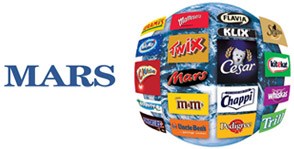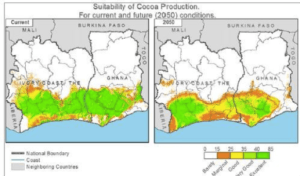Mars Inc Commits to Sustainability

Mars Inc, one of the largest food manufacturers in the world, has taken a strong stance on environmental sustainability based on the immediate impact climate change has on the company's reliance on raw materials.
Background
Mars is one of the largest food manufacturers in the world with estimated sales of over $30 Billion USD per year. The company employs over 75,000 people and operates in over 70 countries.[i] Mars relies heavily on global agriculture to produce a range of products from confectionary food, most notably chocolates like M&Ms, to pet food like Iams or Pedigree.[ii] Given the scale of the business both as a consumer of raw materials and as a producer of carbon, it’s clear that Mars needs to strongly consider the alarming rate of change in climate.
Effects of Climate Change on Mars
Mars is reliant on about 100 primary agricultural products produced around the world. Cocoa, the primary ingredient in some of the company’s most heavily consumed products is sourced from countries mainly in West Africa and is negatively affected by rising temperatures and dryer climates.[iii] Studies have shown that farmers in West Africa will begin to see declines in cocoa yields as early as 2030 and the areas that are currently suitable for farming the crop will decrease significantly.[iv] By 2050, the impact of a global temperature increase of 2° C will have devastating effects to the region[v]:
Although other areas may therefore become more suitable for cocoa trees, the net effect on the supply chain could cause massive inefficiencies for Mars and drive a much higher commodity price for the business. This doesn’t even take into account the most tragic cost, which would be the displacement of thousands of West Africans who rely heavily on farming cocoa as a means to survive.
What Mars is Doing About It
Since 2007 Mars has implemented the Sustainable Sourcing Program. By 2014, the program covered 23 raw materials used by the company, which accounts for 60% of their sourcing volume. The Sustainable Sourcing Program is defined through 5 impact areas: GHG, land use, water, human rights and income. Of the three of these related to climate change, each has a definitive set of goals and has made moderate to impressive progress since 2007[vi]:
|
Impact |
Long Term Goal (c.2007) | Current Progress |
| Land Use | Mars has implemented a Deforestation Policy that requires only sourcing from producers who abide by specific guidelines. | 86% of Mars’ palm oil supply chain can now be traced directly back to the mill. Aiming to add beef, pulp and paper, and soy supply chains by end of this year. |
| Water Use | By 2015, Mars will reduce water use by 25% within factories. | Mars has reached a reduction of 16.8% by 2015. |
| Greenhouse Gasses (GHG) |
Eliminate all GHG emissions from direct operations by 2040. |
Reduced emissions by 25% since 2007 and are currently building metrics to track GHG across entire supply chain |
Some of the notable methods Mars has used to achieve it’s environmental goals has been converting to more renewable energy, increasing the use of recyclable packaging, eliminating landfill waste, and driving more operational and capital efficiency.
In addition to taking direct action within their own operations, Mars has also taken a leadership role within the global food and beverage community. In 2016, CEO Grant Reid signed a letter with nine other major food companies pledging to take action combating the effects of climate change and committing to become an advocate within the business community.[vii]
Looking Ahead
While I’m very impressed with many of the operational changes Mars has made and commits to make in order to change the trajectory of global climate change, I’m still somewhat alarmed at how challenging it seems for the company to fully track the state of this progress within it’s supply chain. For example, given the fact that land use plays such a major role in the net effect of GHG emissions, it would seem like the ability to trace the supply chain through the Deforestation policy would have to be a priority. As mentioned in the table above, after nearly eight years, Mars is still not 100% confident that the initial raw material, pulp and paper, is being produced without damaging forested areas. Although I can imagine it’s incredibly complex to gain visibility into all sources of materials used for such a massive business, it seems that in addition to taking direct action in Mars controlled facilities, leading by example means enforcing high degrees of responsibility from suppliers on this issue and that begins with being able to accurately account for the impact these partners have on the environment.
(797 Words)
[i] [i] Forbes Media, 2016, http://www.forbes.com/companies/mars/
[ii] Mars Incorporated, 2016, http://www.marsgcc.com/brands
[iii] Charles, Dan, NPR, “As Big Food Feels Threat of Climate Change, Companies Speak Up. 2016, http://www.npr.org/sections/thesalt/2015/12/01/456369536/as-big-food-feels-threat-of-climate-change-companies-speak-up
[iv] Stecker, Tiffany, “Climate Change Could Melt Chocolate Production,”, Scientific American, 2011, https://www.scientificamerican.com/article/climate-change-could-melt-chocolate-production/
[v] Nieberg, Oliver, “Devastating impact of climate change on cocoa can’t be ignored…”, 2015, Confectionary News, http://www.confectionerynews.com/Commodities/Climate-change-Impact-on-cocoa-production-devastating
[vi] Mars Inc., 2016, http://www.marsgcc.com/global/sustainability
[vii] Ceres, 2015, http://www.ceres.org/files/updated-global-food-and-beverage-leadership-statement-on-climate-change/




From the article, it seems that Mars is trying to resolve pressures from the climate change through two approaches: making its internal operations more efficient and sourcing from more sustainable suppliers. While improving its operations is within Mars’ direct span of control, requiring its suppliers, such as West African farmers, who are already struggling to meet an growing problem of yield drops to abide by more stringent guidelines sounds like adding fuel to the flame. Unless Mars’s operational efficiency improves significantly, it will not be able to subsidize its suppliers’ hit on cost surge from more sustainable way of farming. That being said, we have seen that IKEA was also faced with a similar issue and had few options to source woods in a more green way–one of which is to lease more lands and directly control forestry management. Can vertical integration, i.e. acquiring lands and farming in a more environmentally friendly manner, also be an option for Mars? If not, how should Mars go about influencing its suppliers without putting too much pressure on their profitability?
As a big consumer of Mars’ candy products (especially around Halloween time!), it was very interesting to read about the three impact areas the company is focusing on to help affect climate change. Given that Mars operates in over 70 countries and has such an enormous revenue stream, it seems to me like the company should be capable of having a bigger influence over global environmental issues. For example, I’m surprised that the company doesn’t have more joint initiatives with governments of the countries they have operations in to encourage energy efficiency and conservation, especially in developing countries that may not be as knowledgeable about these issues. While it is admirable that the Mars CEO joined other CPG executives to become an advocate for climate conservation in the business community, I hope that the company is able to take it one step further and advocate for positive environmental actions in its broader global community too.
Andrew, this post made me hungry! I’m really impressed by all of the work that Mars is doing to reduce the environmental footprint and to see how far they have come in achieving their goals. I agree with KS above about the potential for vertical integration to make sure that Mars is adhering to its own policies on high standards. I think this is also an opportunity to impact the lives of West African farmers who will be adversely affected by climate change. If Mars can provide the financial support for these farmers, keep them from being displaced, and provide Mars full control over the quality of its cocoa. Of course, there is the risk, as was in the IKEA case, that this would get Mars into a completely different type of business than it has been accustomed to working in, but perhaps climate changing times, cause for organization changing measures?